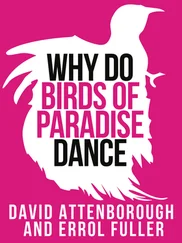Remarkably, none of the store windows broke; but there are drifts of plant debris and enormous palm fronds strewn across the parking lot like wreckage, their ends curling and gray. Power lines dangle from a pole at the corner, a child’s pink shoe lies on its side in the middle of the parking lot. The generator roars, loud as a jet engine against the west wall. Blinking, shielding their eyes, the four of them wander, moving around fallen branches, the stump of an upended ficus tree. They are quiet, startled shipwreck survivors. Abruptly Emerson grabs the stump. “Where do you want this stuff?”
Stanley and Emerson designate a plant trash heap beside the dumpster and begin the tedious, oddly exhausting work of clearing and hauling. Emerson — Stanley notes — is a good worker, moving easily: the more he works, the more relaxed he seems. Felice and Nieves clear the doors, mop up the entrance, and sweep the store’s concrete perimeter. Then they carry out aluminum lawn chairs from the storage room and a thermos of passion fruit tea and settle in to watch the men work. Stanley is still waiting for the moment Felice will stand and stretch, put her hands on her hips, pace a bit as if rehearsing her exit. He’d dreaded it when they were younger — the preamble before she’d go out at night. But Felice seems content to be just where she is, reclining in an old chair, feet propped on an overturned grocery cart.
“This is a great setup,” Emerson says. He and Stanley are at opposite ends of a black walnut branch, lugging it to the heap — now piled high with branches and coconuts. “Your market — it’s awesome. Like a community-service-type place, but also a great store.”
“Yeah, I don’t know about the great part.” Stanley and Emerson swing the branch into the debris pile where it lands with a thump. “What we’re shooting for, just basically, is to make good food available. Like, affordable. Talk about a magic act. Dole and General Mills getting these major subsidies, and we’re telling the local growers we don’t want to charge more than the chains do for their conventional and processed crap. We do what we can — take food stamps, all that. We offer barter and volunteer discounts, whatever we can think of. Keep overhead low.”
Emerson squints at the store, hands resting on his hips. “Well, you’re still standing, right?”
“Barely.” Stanley uses the thumb of his leather work glove to push hair off his face. “I used to work at a co-op — everyone kept squabbling and leaving — couldn’t hang on to customers. Of course, when I bought this place the old hippie contingent said I was turning ‘establishment.’ ” He sighs. “Anyway, yeah, with this place the employees can own shares in the business — they run their own sections. Decent benefits, vacations, workshops. Blah, blah. And we’re always behind on the bills. This place has been smoking money since the second I opened it.” He smacks the dust off his gloves and surveys his storefront. “Maybe it’s not losing money as fast as it used to. I guess that’s something.”
“Sounds good to me.” Emerson looks at Stanley, then at his own feet. Stanley realizes then that Emerson wants Stanley to like him.
They sweat through their clothes and have to take breaks at shorter intervals. Stanley drinks iced tea until he can feel it sloshing in his stomach. He and Emerson clutch the wet glasses, pressing them against their faces. By noon, the sun roasts the air and a vaporous steam shimmers everywhere. Stanley suggests they break until sundown. But Emerson pulls off his T-shirt (Stanley marvels at the fan of muscle radiating from his neck and back), soaks it with a garden hose, and wraps it around his head. “I’ll just go for a little longer, if that’s okay.” His innate politeness catching Stanley off-guard.
Retreating, Stanley discovers both Felice and Nieves inside the apartment sprawled on the leftover bedding and pillows on the floor, watching cartoons. They’re eating the “all-natural” toaster tarts Nieves persuaded him to carry.
“Hey, sweat monster.” Nieves kisses him, a drift of sugary blueberries on her breath. “Electricity’s back on. Yay.”
Felice looks at him mildly, almost vacantly, and once again there is the unreal sensation: Can she truly be here? He goes to shower and as the cool water spills over him, he considers unhappily that he’s no longer as angry as he used to be. It was so difficult — almost impossible, really — to put her away emotionally, to stop wondering where she was or if she’d return — he doesn’t want to relinquish all that hard work. And think of what she’d done to their mother! His stomach tightens like a fist beneath his rib cage. As he’s rinsing off the layers of soap, a thought creeps into his mind: She’s going to slip out while I’m in the shower.
He forces himself to not rush: he taps up the warm and shaves in the shower, then lingers a few seconds under the spray. He towels off thoroughly, combs his hair, his pulse rising in his throat, breath. Is she gone yet? He tells himself that he isn’t being quite rational. Finally he wraps a towel around his waist and emerges from the bathroom: the TV is off; the bedding has been folded and stacked on an armchair. Something like a dense, dark pressure settles over him. It is resonant with old emotional weight — the loneliness of his old bedroom, the backseat of his parents’ car, staring out the window, eternally searching — no matter if they were just going to the store, to school, to the movies. He tugs himself away from the feeling. No, I won’t . Even if his hands tremble as he pulls on his pants. Because she will not do that to him, or to anyone he loves, again. He is not that boy who drove through the neighborhoods, imagining the worst things in the world, his chest filled with a sagging emptiness, looking for a sister who, he believed, had to be injured or dead.
Stanley picks up some of the accounting paperwork and a notebook from the desk in their bedroom. He’ll need to inventory any exterior wind damage and inspect the inside of the market. The thought intrudes again: She’s gone . He instructs himself: Then I’m glad. Felice will always land on her feet. He lets the apartment door swing shut behind him and takes the wooden steps down to the landing behind the building. It occurs to him then to wonder where Nieves is. He considers that Felice could not have been a good influence on his girlfriend or future baby: like a free radical, unsettling the environment. He climbs over some bramble that had blown in at the foot of the landing and the chain-link fence encircling the sides and rear of the market. The air vibrates with a high-pitched whine; Stanley walks the perimeter, gathering the twigs and debris, then stops abruptly: Emerson is still there.
He’s out in front with Noah Tibold, who owns Zone Ten exotics nursery, and Nancy Pegrum — one of Stanley’s cashiers. Noah is using a small chain saw to take apart a bougainvillea that toppled over the lot’s north entrance. Emerson and Nancy rake piles of twigs and leaves. There’s such a settled, contented rhythm to their work that for a moment Stanley just stands there quietly, watching.
Stanley’s joints and muscles seem to loosen, relief coursing through his body. If Emerson is still here, Felice must be as well. But relief is immediately followed by stern annoyance. Stanley enters the front of the market. The generator is off and the air-conditioning seems to be functioning — he’d been braced for the pungent effluvia that had pervaded the store after Hurricane Charley. There’s some frost buildup on the dairy cases, the cut flowers have withered away, and the magazine covers of women in yoga poses or of gleaming plates of vegan stew ( New Vegetarian ) have all curled and buckled. But they appear to have come through the storm intact.
Читать дальше












